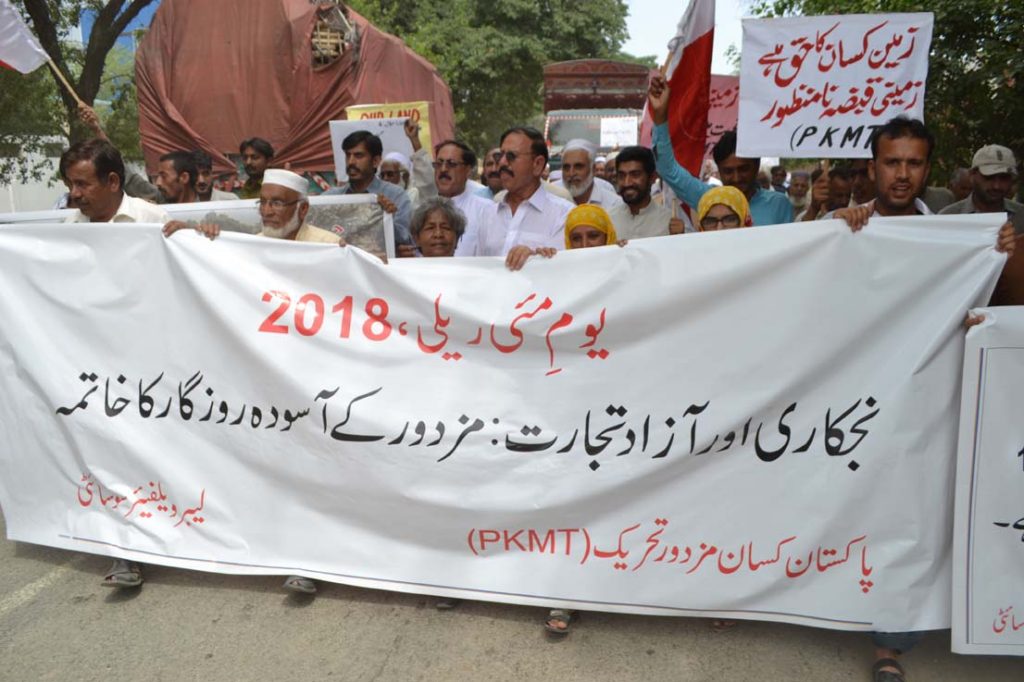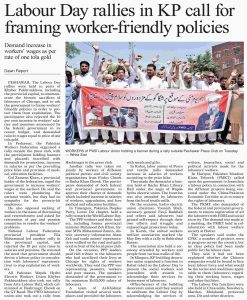پریس ریلیز
یکم مئی، 2018
مزدوروں کے عالمی دن یکم مئی کے موقع پر پاکستان کسان مزدور تحریک اور لیبر ویلفیئر سوسائٹی نے حطار، ہری پور، کے پی کے میں ایک جلسہ کا انعقاد کیا۔ جس میں بڑی تعداد میں مزدوروں نے شرکت کی۔ یہ دن 1886 شکاگو کے مزدوروں کی جدوجہد کے تناظر میں منایا جاتا ہے کہ جب مزدوروں نے اپنے حقوق خصوصاًآٹھ گھنٹے کام کے اوقات مقرر کرنے کے لیے اپنی جانوں کا نذرانہ پیش کیا تھا۔
پی کے ایم ٹی کے عہدیداروں کا کہنا تھا کہ حکومت عالمی سرمایہ دار اداروں کی ایماء پر ملک کے قیمتی اثاثے کوڑیوں کے مول ملکی اور غیر ملکی سرمایہ داروں کو فروخت کررہی ہے جو مزدوروں میں بیروزگاری اور غربت و بھوک کی بنیادی وجہ ہے۔ حطار میں قائم مستحکم سیمنٹ فیکٹری ایک ایسی ہی مثال ہے جسے غیرملکی کمپنی کو فروخت کردیا گیا جس سے نا صرف فیکٹری کے مزدوروں کو ملنے والی مراعات ختم یا محدود کردی گئیں بلکہ نجی کمپنی کی جانب سے زیادہ سے زیادہ منافع کے حصول کے لیے پیداوار میں غیر پائیدار اضافے سے علاقے کا ماحولیاتی نظام بھی تباہ ہوکر رہ گیا ہے۔
لیبر ویلفیئر سوسائٹی کے عہدیداروں کا اس موقع پر کہنا تھا کہ اٹھارویں آئینی ترمیم کے بعد مزدورں کی بہبود کا محکمہ صوبائی حکومتوں کو منتقل ہو گیا لیکن اب تک صوبائی حکومتوں کی جانب سے مزدور قوانین اور اس پر عملدرآمد کے حوالے سے کوئی جامع پالیسی ترتیب نہیں دی جاسکی ہے۔ خیبر پختونخوا میں ورکرز ویلفیئر بورڈ کے زیر انتظام مزدوروں کے بچوں کے لیے چلنے والے اسکولوں میں معیار تعلیم انتہائی ناقص ہے جہاں بچوں کی کامیابی کا تناسب انتہائی معمولی ہے۔ بورڈ فی بچہ 17,000 روپے خرچ کرتا ہے اس کے باوجود مزدوروں کے بچے معیاری تعلیم سے محروم ہیں۔ ورکرز ویلفیئر بورڈ لیبر کالونیوں میں مزدوروں کو رہائشی کواٹر کے مالکانہ حقوق نہیں دیتا جبکہ ملک میں بقیہ تین صوبوں میں مزدورں کو رہائشی کواٹر کے مالکانہ حقوق دیے جاتے ہیں۔
مقریرین کا کہنا تھا کہ سی پیک کے تحت ملک میں بڑے پیمانے پر خصوصی اقتصادی زون کی تعمیر اور مختلف صنعتوں اور شاہراؤں کی تعمیر جاری ہے لیکن اب تک اس حوالے سے مزدوروں سے متعلق کوئی پالیسی واضح نہیں کی گئی کہ چینی سرمایہ کار کمپنیاں مقامی مزدوروں کو روزگار فراہم کرنے کی پابند ہونگی، ان مزدوروں کے کام کے اوقات کار، اجرت اور دیگر سہولیات کی فراہمی کو یقینی کیسے بنایا جائے گا۔ اکثر یہ دیکھنے میں آیا ہے کہ کمپنیوں کی جانب سے مزدوروں سے انتہائی کم اجرت پر آٹھ گھنٹے کے بجائے 12 گھنٹے کام لیا جاتا ہے۔ ملک بھر میں صنعت ہو یازراعت یا ماہی گیری شعبہ تقریباً ہر شعبے میں مزدور نجکاری، ٹھیکیداری نظام، کم اجرت اور دیگر بنیادی سہولیات کے فقدان کی وجہ سے غربت و بدحالی کا شکار ہیں۔
سرمایہ داروں کی ہر حکومت صنعتکاروں اور سرمایہ داروں کے کالا دھن سفید کرنے، ٹیکس میں چھوٹ دینے، سرمایہ کاروں کو مفت زمین فراہم کرنے، انہیں زرتلافی اور دیگر مراعات دینے کے لیے قانون سازی کرتی ہے اور ان قوانین پر عملدرآمد بھی ہوتا ہے لیکن بات جب مزدوروں اور دیگر پسے ہوئے طبقات کی ہو تو ان کے حقوق کے تحفظ کے لیے مزید قانون سازی تو دور پہلے سے موجود قوانین پر بھی عملدرآمد نہیں کیا جاتا۔ ملک بھر کے محنت کشوں کو اس استحصال سے نجات اور اپنے حقوق کے لیے متحد ہو کر جدوجہد کرنے کی ضرورت ہے کیونکہ یہ ظالم سرمایہ دار طبقہ کبھی بھی مزدوروں کے حقوق دیگا۔
پی کے ایم ٹی اور لیبر ویلفیئر سوسائٹی مطالبہ کرتی ہے کہ نجکاری، ٹھیکیداری نظام کا خاتمہ کیا جائے، عارضی مزدوروں مستقل کیا جائے، مزدوروں کی کم سے کم اجرت ایک تولہ سونے کے برابر مقرر کی جائے، مزدور عورتوں کو مردوں کے برابر اجرت دی جائے، مزدور آبادیوں میں معیاری تعلیم، آلودگی سے پاک ماحول اور باعزت روزگار فراہم کیا جائے۔ مزدوروں کے لیے پیشہ ورانہ صحت و تحفظ کا کام کی جگہ پر معقول بندوبست کیا جائے۔ تمام مزدوروں کی سوشل سیکورٹی اور ای او بی آئی کے ساتھ رجسٹریشن کو یقینی بنایا جائے۔ مزدوروں کو لیبر کانوینز میں رہائشی کوارٹرز کے مانکانہ حقوق دئیے جائیں۔مزدوروں کی بچیوں کے لیے جہیزگرانٹ سالوں سے بندہے فوری بحال کی جائے۔
جاری کردہ : پاکستان کسان مزدور تحریک اور لیبر ویلفیئر سوسائٹی



